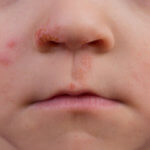
Leaky Gut or intestinal permeability is a condition that causes undigested proteins such as toxins, microbes, and gluten to pass into the bloodstream. This condition is caused by damage to the intestinal wall. When this area becomes damaged it allows these particles to pass through and into the blood. When they enter the bloodstream it can cause inflammation throughout the entire body and may initiate the body to create an immune response.
If a leaky gut is not healed it can lead to a number of different conditions including inflammatory bowel disease, arthritis, food sensitivities, hypothyroidism, eczema, depression, anxiety, and more. While healing leaky gut can be difficult and will take some time, it is possible. Taking supplements and changing your diet are a couple of things that you can do to help heal leaky gut. Here are ten symptoms of leaky gut as well as some ideas about how to heal it.
1. Food Sensitivities
One of the signs that you may have leaky gut is the development of food sensitivities. When toxins enter the bloodstream from the intestinal walls, the immune system will often go on overdrive. When this happens there will be various antibodies being produced. These can cause the body to become more susceptible to some antigens that are found in certain types of foods. Some of the most common foods that people become sensitive to when they are suffering from leaky gut are dairy and gluten.
In some studies of rats as well as in human children, leaky gut has been linked to food allergies. In fact, developing food sensitivities of any type is one of the most common symptoms of leaky gut. If you notice that you do not feel well after eating certain foods, especially those that contain gluten or dairy, chances are good that you have developed a leaky gut.


